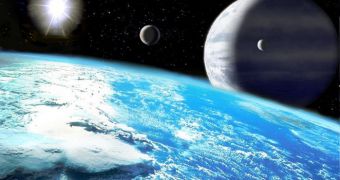A group of astronomers has recently published a new report, indicating areas in the Universe that are very likely not to be able to support Earth-like exoplanets. Finding such an object is the holy grail of exoplanetary research, and so this list may help save researchers a lot of time.
The investigation is also important when considering that the NASA Kepler Space Telescope has thus far discovered in excess of 1,300 exoplanetary candidates, of which 80 percent are expected to be confirmed.
This raises the total of known, confirmed exoplanets to well over 1,000. None of them has thus far been determined to be a perfect analog for Earth, but there are several that have similar key characteristics.
In the new study, entitled “Rare Earth – Why Complex Life is Uncommon in the Universe,” experts detail the regions of space that can be cataloged as dead zones, incapable of supporting life.
The work was compiled by University of Washington professor of geological science Peter D. Ward, who is also a curator of paleontology. He conducted the research with UW professor of astronomy and National Academy of Sciences (NAS) member Donald Brownlee.
One of the areas that cannot support life is the early Universe, a place where only metal-poor galaxies existed. Without heavy elements, life as we know it couldn't have possibly evolved. In fact, it's highly unlikely that exoplanetary formation was possible
Elliptical galaxies and globular clusters are also among the structures that cannot possibly support exoplanets and life, the team argues. The latter contain stars that are simply too hot to allow for the existence of anything remotely similar to life on the surface of their inner planets.
Galactic centers and edges also contain conditions that are too harsh to enable the development of lifeforms. While the former are blasted with radiation from black holes, the latter do not contain metal-rich stars.
“We have found that most other planets and solar systems are wildly different from our own. They are very hostile to life as we know it,” explains Howard Smith. The expert holds an appointment as a senior astrophysicist at the Harvard University.
Experts go on to say that believing we are alone in this vast Universe is evidence of ignorance and self-importance. Discovering other civilizations is a matter of when, not if, Daily Galaxy concludes.

 14 DAY TRIAL //
14 DAY TRIAL //